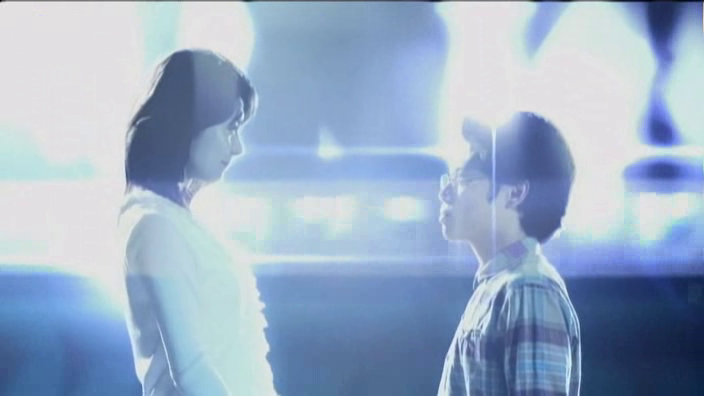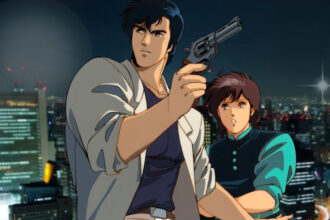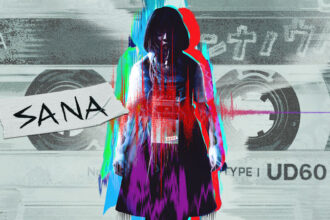The year 2025 marks the 20th anniversary of the wildly successful Japanese TV drama “Densha Otoko”. It’s a series that is at least somewhat based on a true story about an anime otaku who falls in love with a woman and seeks help from members of an anonymous message board, asking the other users how he can become the best version of himself to make the most positive impression on her. But in order to tell that story, it’s important to understand the real-life tale of what had happened online just one year prior.
In the year 2004, a particular internet forum was being frequented by a group of strangers across Japan, all rooting for a man they had never met to find success in his personal love life. That forum was the text board known as 2channel–the precursor to the imageboard 2chan, which itself was a precursor to its English equivalent 4chan. If you have ever visited a text or an image board, you already have a basic idea of what the 2channel forums looked like. The boards were split up into various subjects, ranging from sports and money to games and hobbies, with any number of open threads running at any given moment in time. Posts on these forums were largely anonymous, unless you chose to identify yourself, and you could further ensure no one could impersonate you by filling in a unique Trip code. At least as far as Western boards like 4chan were concerned, giving yourself a Trip name was often considered to be an egotistical move (and 4channers would often call you a slur if you did it). The threads had a limit of 1,000 posts, locking the thread once it reached its limit, forcing users to start new threads if a topic became particularly popular.
2channel and its multiple image board offspring iterations are almost all well known for varying levels of controversy, from the mild to the horrific. Any good netizen knows to be wary of what you might accidentally consume by scrolling around on a ‘chan board. Even in “safe for work” boards, you aren’t guaranteed that some random user hasn’t uploaded an image of something absolutely vile and profane, possibly even illegal. But despite the fact that law enforcement has gotten involved with these boards multiple times across many countries, on top of the fact that 2channel’s original owner Hiroyuki Nishimura had been sued over one hundred times for owning a platform that published large swaths of defamation, it somehow didn’t slow down the popularity of these boards in Japan. By the year 2007, ten million users were accessing the site a day. While in other parts of the world, image boards may seem to cater to much more niche communities, 2channel was a cultural phenomenon that was as widely read as the local newspaper.


In the spring of 2004, on a board dedicated to single men (often referred to as the “Poisonous Men Board”), a certain thread titled, “Men Being Shot from Behind” was gaining traction. Men would come to the thread to complain about their single lives. With a modern eye, a bunch of men getting on an anonymous forum to complain about their lack of good experiences with women would send up a lot of red flags. In one specific instance, somehow a truly incredible story was born from this thread.
One anonymous poster joined the discussion to talk about a brief interaction he had with a woman on a train. In his posts, the 22-year-old man told the story of how he, a self-described otaku, had just finished doing some nerdy shopping in Akihabara. While on his train ride back home, an obnoxious, drunken old man also boarded the train and began harassing the female commuters. While everyone else on the train was trying to ignore the harasser in the hopes of not stirring up any more trouble, the 22-year-old otaku suddenly found himself standing up and telling the old man to leave everyone alone. By his own admission, the otaku was very nervous and had never been in a fight before. Regardless, a short scuffle started, which drew the attention of others on the train including the train attendant, and the old man was taken to the police at the next train station. The otaku, along with four other women, also got off at that stop to give the police their account of what had happened on the train. An older woman asked the otaku for his address so she could send him a thank-you gift for his bravery and kindness. And then a younger woman closer to his age requested his address as well.
The otaku had posted this story with the mindset that this was as good as life was ever going to get for him–that the best he could possibly hope for was this brief kindness from a woman he had encountered for only a few minutes and would probably never see again. But soon after, the otaku found he had received a thank-you gift from the younger woman on the train. Inside a delivery parcel was a pair of name-brand Hermes teacups, a gift that surely came at great expense and seemed to indicate a message far above and beyond a simple “thank you”. When the otaku told the members of 2channel about these cups, the other board users became excited and newly invested in the otaku’s seemingly budding relationship with this mysterious woman. Despite the stigma of this man being a huge anime and video game nerd with no chance of building a relationship with anyone outside his interests, the users of the board encouraged him to use the phone number listed on the delivery packaging to make contact with her.
From this point on, the otaku–who had now created a tripcode to permanently label himself as “Densha Otoko” (Train Man)–religiously logged onto the forums to update the members of the board on his progress in getting to know and fall in love with this woman (whom the board had now nicknamed“Hermes” after the brand of teacups she had sent him). He would regularly ask the board for help and advice on what to do in certain situations such as getting his hair styled, his wardrobe updated, and what restaurants would be good to invite her to.
The most widely known version of this story ends with Densha Otoko just two months later reporting that he had confessed his love to Hermes, that she had reciprocated, and even shared a romantic kiss, to the delight of the other board members. Following this, the board members instructed Densha Otoko to “graduate” from this ongoing topic of discussion and join a couples discussion instead, as the thread reached its 1,000-post limit with Densha never being heard from again.
That’s the popularized version of the story, anyway. The reality is a little more complicated than that. The story was simplified down to its most entertaining parts for the sake of a more casual reading audience by a board member known only as Nakano Hitori (literally, One Person Among Many). Nakano Hitori had edited and published several other entertaining stories from the “Men Being Shot from Behind” threads, including the Densha Otoko story, leaving out other unnecessary chatter and flame wars. The popularized version, which would be published as a novel in October of that same year, also does not address inconsistencies in Densha’s story about himself, or the fact that it may have been possible that multiple people were writing Densha’s story.


Whatever the case may be, the truth of the matter is that someone did, in fact, post on the 2channel boards portraying themselves to be this “Densha Otoko” person, and somehow in the middle of a bog of user-generated content, other members of the board did do their best to encourage Densha to become the best version of himself and win the heart of a woman–something the rest of them thought couldn’t possibly happen to them, showing them that not all hope is lost in their pursuit of genuine love.
Despite the story forming on a website with a history of dedicated harassment campaigns and the mobilization of Japan’s right-wing extremists, Densha Otoko’s tale is somehow still an enduring and emotional one. Many readers can empathize with the idea of being a nerd who believes they will never find true love because of their interests. Not only does Densha’s story make the reader believe that love may actually be in the cards for themselves, but the enduring friendship and camaraderie built between the members of the message board is touching in and of itself. The portrayal of everything in those Densha Otoko threads being sunshine and rainbows is very likely highly inaccurate, but the charm from those with genuine interest and dedication to helping one another find happiness is truly moving. It portrays a version of the internet that may never have truly existed but is still one many long for and aspire to create. Everyone wants a place where we can see the best in each other and help one another grow. And although we are more connected now than we have ever been in human history thanks to newer iterations of social media, there is still something special about being able to interact with others in dedicated forums, where the firehose of outside noise isn’t constantly blasting its users with unrelated outside information. It’s for that reason that Densha Otoko’s story is so enduring, even over twenty years later.
It is little wonder, then, that the Densha Otoko narrative exploded in popularity in Japan over the next year, reaching audiences far outside the reach of the users of that specific 2channel thread. After the publication of the novelization of Densha’s threads in October of 2004, multiple manga adaptations were published, some of which received official English localizations, published by Viz, CMX, and Del Ray Manga. When the original novel got officially translated into English, I remember standing inside a local Borders bookstore and reading nearly the entire thing front to back right there in the aisle (back when it was particularly problematic to find manga fans clogging the manga aisles by sitting in the middle of the floor and reading a manga without ever purchasing it).
By 2005, both a live-action film adaptation and a TV drama adaptation had been announced and were being produced at almost the same time as one another. The film adaptation, released in March of 2005, featured Takayuki Yamada (“The Hero Yoshihiko”, “The Naked Director”) as Densha Otoko and Miki Nakatani (“Ring”, “Ring 2”) as Hermes. The original Densha from the 2channel threads had stated that he believed Hermes closely resembled Nakatani, thus leading to the casting decision. Despite my fondness for Takayuki Yamada as an actor in many other roles since this movie, I find the film adaptation to be a bit slow and dry. As far as adaptations go, it mostly regurgitates the narrative presented on 2channel, but everything filling in the gaps as to who Densha and Hermes are as people is pretty bland, all things considered. What is interesting, however, is that the film’s post-credits scene features cameos from the actors who would play Densha and Hermes in the TV adaptation later that year, acting as something of a hand-off from one Densha actor to another, teasing the upcoming show.
The TV drama adaptation of “Densha Otoko” began airing in July of 2005, starring Atsushi Itoh (“Battlefield Baseball”, “Neko Atsume House”) as Densha, and Misaki Ito (“You’re Under Arrest”, “Maison Ikkoku”) as Hermes. The TV drama was my first introduction to the Densha Otoko story, and as such it probably has a lot to do with my emotional attachment to this adaptation specifically. But even despite that first-timers’ bias, I genuinely believe it encapsulates all of the strongest elements of the story and is the most emotionally moving depiction of the 2channel events.
Directed by a three-man team of Hideki Takeuchi (“Nodame Cantabile”), Masaki Nishiura (“Barefoot Gen”), and Kazuhiro Kobayashi (“Love Revolution”), the show nails the otaku experience. Anime fans will find it instantly relatable as the show opens its first episode with a montage of shots of wandering through stores in Akihabara, shopping for precious anime figurines, models, manga, and assorted merchandise. The show isn’t the slightest bit afraid of showing any number of real-world existing anime and video game licenses. Densha’s room (his offline name in this adaptation of the story is Tsuyoshi Yamada) is covered floor-to-ceiling with anime merchandise from franchises such as Panda-Z and Neon Genesis Evangelion, but especially Mobile Suit Gundam, with figures of mobile suits littering his shelves and a Principality of Zeon flag hanging on his wall. Tsuyoshi also owns Keroro t-shirts, a Keroro hand puppet, and touts a Keroro charm on his backpack from the manga and anime series Sgt. Frog, a seemingly direct nod to something the Densha Otoko from the message boards said he regularly watched and believed was going to be “the next big hit of our time”.


The opening of every episode of the series is a loving tribute to the famous 1983 pre-Gainax fan animation Daicon IV, which featured a girl in a Playboy bunny suit having epic interactions with every single licensed comic and movie property imaginable, set to Electric Light Orchestra’s “Twilight”–a song which would later go on to be widely recognized as something of an unofficial otaku anthem. Densha Otoko’s homage to Daikon IV is immediately recognizable, as “Twilight” again plays here, set to brand new animation by Gonzo, featuring a bunny girl character unique to this particular TV show named Mina riding atop a flying commuter train as it navigates the skies above Akihabara and flies into space. It’s a level of dedication to the story that is so special that it is emotionally moving all on its own before we’ve even seen hardly any of the story develop at all. It’s a shame, then, that although Mina has her own animated TV series within the context of the Densha Otoko show, the actual anime (“Getsumento Heiki Mina”) that would be released in the real world in 2007 is wildly different from what’s depicted in Densha Otoko, and frankly is pretty disappointingly unremarkable.
Over the course of 11 episodes (not counting the two additional follow-up specials that would come later), we are slowly introduced to the characters of Tsuyoshi and love interest Saori, filling in our imaginations for what these people must be like outside of what Densha tells the members of the message boards (known in this series as A-Channel). Learning about who Tsuyoshi is in episode one makes him incredibly relatable. I think many will find it easy to identify with someone who is clearly stuck in a dead-end job with an unlikable boss (in this case played by the ever-hilarious Jiro Sato), receiving little to no respect from many of the people in his life, outside of two other close otaku friends. When Tsuyoshi has a particularly bad day in which no one remembers his birthday, he very nearly contemplates ending his own life, stopping just short of actually doing so.
Tsuyoshi is at his absolute lowest point emotionally, nearly at his utter limits, when the incident on the train with the drunken old man occurs. And it is in his time of greatest despair that he is given this glimmer of hope that something wonderful could finally happen to him. It is what makes the motivation for this character to achieve true love and happiness feel absolutely earned and deserved.
It helps that the pre-existing story was already so motivational, but the original writing for the rest of the TV drama is also uniquely powerful. Aside from Tsuyoshi’s work and home life circumstances, Saori is also portrayed as someone who has struggled significantly in her own life. It is true that she comes from wealth and had a good-paying office job. However, we learn throughout the series that she once dated someone for two years who had hidden the fact that he was a married man. This incident scarred her emotionally and made her particularly sensitive to lying, no matter how minor the infraction. And honestly, she has every right to feel that way, especially after what was done to her. This is on top of the fact that we see Saori’s mother was also traumatized by her own husband’s similar behavior, making the entire nuclear family, including Saori’s brother, sensitive to deception in a manner akin to an exposed nerve.
There are moments where you can tell that the writers had to pad out the story, especially when it comes to character embellishments. Since they’ve given Saori a backstory with a sensitivity to being lied to, we now have to have a dose of some good old classic anime-style miscommunication episodes. When Tsuyoshi and Saori sit down for their first dinner date, Saori asks what Tsuyoshi enjoys doing in his free time. He explains that he surfs the internet, but Saori not being an online person in the slightest confuses “net surfing” with actual physical surfing on a surfboard and riding waves in the ocean. Tsuyoshi, being entirely too nervous and unsure how to handle the misunderstanding, simply allows her to believe that that’s what he meant, especially because she seemed so genuinely interested in his “surfing” hobby. We spend an episode with Tsuyoshi trying to teach himself how to surf in order to overcome the lie, but he doesn’t ever get good enough at it to believably prove that he can pull it off. Instead, Tsuyoshi ends up confessing at the last possible moment that he can’t really surf at all and that the entire thing was a misunderstanding. He is fortunate that Saori sees how hard he tried to make up for the misunderstanding and that he admitted his mistake to her, thus forgiving him right away. Many others would have seen the lie as a red flag, especially after they had previously been the butt end of a tremendously awful lie, but Saori’s forgiveness shows the viewer just how good and kind she is. She may be much better than Tsuyoshi deserves.
It becomes frustrating, then, that the writing team decided they wanted to tackle this issue twice. By this point in the story, Tsuyoshi has already had to learn a harsh lesson about keeping secrets from someone he cares so much about, and yet he lies to her again about going to a Comiket-like doujinshi event, instead telling her he is attending a work event, in the hopes that he can continue to keep his identity as an otaku a secret. And I understand, for Tsuyoshi, he is reasonably terrified that someone will learn about his hobbies and thus will find him detestable and will no longer want to associate themselves with him. Society has taught him that he has to keep his nerd-like tendencies to a minimum if he wants to exist alongside everyone else. But the fact that we are showing this by having Tsuyoshi lie to Saori about part of his life yet again is probably the weakest part of the show. By the time Saori discovers Tsuyoshi was at an anime event instead of work, she’s not even remotely concerned about the fact that she caught him in full otaku mode. She’s heartbroken that this is now the second time that Tsuyoshi has lied to her. And what’s further frustrating is that Tsuyoshi is written as though he initially believes she is mad about the otaku thing, and not the lying thing–a thing that he has already been through with her once before. At this point, Saori’s reaction is understandable. To her, it doesn’t matter that these were such small lies. It’s the fact that he’s willing to lie at all and that he’s already done it to her more than once. And if he’s willing to lie about things that small in such a short amount of time since knowing her, what else could he be capable of lying about? Her initially wanting to end the relationship here is more than reasonable.


Aside from this one point of personal frustration, the TV drama remains largely an emotionally satisfying ride the entire way through. The supporting cast is equally as lovable as the leading actors. Many of the A-channel message board users appear only briefly with little to no character development, but they’re extremely likable. Many of these actors have gone on to play other recognizable roles in the years after. There’s the weight lifter, the middle school student, the businessman, the train otaku, the dedicated traveler, the shut-in, the guy who almost exclusively makes nothing but motivational ASCII art, and so many more wonderful and memorable characters. I found myself later on recognizing the rock-’n-roll board member as Kazuki Namioka, known for later roles in tokusatsu shows like “Lion-Maru G” and “Kamen Rider Gaim”. One board member regularly seen as part of a couple reading the board and commenting together is Tomoaki Hamatsu, who many may recognize from the recent Hulu documentary “The Contestant”, about his experience in 1998 as the unwitting star of a particularly cruel reality TV show, which launched him to fame afterward. Perhaps my favorite board member is the guy whose entire life seems to be centered around cheering for his favorite baseball team, Osaka’s Hanshin Tigers. We often see him as one of the few members reading his own messages out loud rather than being narrated via ADR, and he not only has some of the best advice but is willing to go to some of the greatest lengths to help Densha accomplish his dreams. Some board members will get little single-episode vignettes, showing that watching Densha grow as a person has now motivated them to also grow to become better people in their own lives. It became a fun game, watching as the show would occasionally weave the board members into the real world, sometimes unwittingly interacting with Densha Otoko himself without either party ever knowing who one another was.
The original soundtrack by Face 2 FAKE–a duo comprised of Achilles Damigos and Oh!Be who together have composed, arranged, and produced music for popular musical artists such as SMAP, Exile, and V6–paints a moving picture with just their background music alone. There are now tracks on that soundtrack that I will listen to all on their own such as “Nanashi-san” or “Benoist” that still leave me weeping, remembering moments when Densha poured his soul out onto the internet or shared a tender moment alone with Hermes. But the album also has comical tracks such as “Mochitsuke Ore” for comedic situations, such as when Tsuyoshi asks Saori’s friend where a restaurant restroom is located, only for her to cruelly joke that you have to take the elevator down and then back up to find the restroom located on the exact same floor he started. The show also regularly features licensed music from Styx (“Mr. Roboto”), Earth, Wind & Fire (“Fantasy”), and C-C-B (“Romantic ga Tomaranai”). The show wouldn’t be complete without the incredibly emotional rock song “Sekai wa Sore wo Ai to Yobundaze” (That’s What the World Calls Love) by popular rock band Sambomaster.
The combination of the original story from 2channel along with exceptional writing, acting, a phenomenal soundtrack, and incredible editing results in a complete TV show experience that has stuck with viewers like few other TV dramas can. From personal experience, I can remember a time during college when I watched the series in the middle of the night with my roommates, knowing we still had work and school the next day. The episodes are especially good at cliffhangers, cutting to the ending theme song just as a character is in the middle of saying or doing something incredibly important. It was a choice that left me and my friends shouting at the screen at the end of every episode and then insisting that we just had to immediately put on another episode to see what happens next. I have never before or since been that motivated to continue a TV drama in a single sitting. My husband has even recounted a story to me of showing the first episode of Densha Otoko to his own college anime club, who weren’t sure what to expect, but as soon as the first episode finished, the whole room demanded they immediately tackled the next two episodes. The immediate investment in the story was just that intense. And in recently rewatching the series along with family, the reaction was equally as powerful. By the final episode, everybody in my living room was still bawling their eyes out, even already knowing exactly how the series was going to play out.


The legacy the series leaves is indeed a powerful one. In looking up the music video for the ending theme by Sambomaster on YouTube, you can still see relatively recent comments from Japanese users saying things like, “(Densha Otoko) was a drama that truly symbolized the Heisei era. There won’t be another drama like this in the future.” And I have to agree with that sentiment. 2025 marks the 20th anniversary of the Densha Otoko TV drama, and in the last twenty years, I have not found another drama that has stuck with me the same way this one has. It’s no surprise that the show received six awards during Japan’s Television Drama Academy Awards in 2005. In 2008, while I was studying Japanese in Tokyo, I found a reproduction of Densha’s bunny girl Mina figure that he keeps on his desk, sitting in great condition in its box at a used figure shop in Akihabara. For me, it felt like a purchase of great moral imperative, and it remains one of my greatest prized possessions to this day.
The two extra episodes of the series are somewhat less necessary, and in fact, feel like they could be skipped entirely. The first of the two, “Another Ending Special: Train Man vs Guitar Man!!” is largely a recap episode, with extra time dedicated to both the Hanshin Tigers fan and one of Densha’s best friends, both managing to find love during the time of Densha’s own personal growth. Some of the stories are cute enough, but they aren’t really necessary to understand the impact of the original series.
The second follow-up episode, “Densha Otoko Deluxe: The Final Crusade”, is almost wholly unnecessary. Not only is it nearly two hours in length, but a large part of the plot revolves around Tsuyoshi traveling to Tahiti in search of a mythical black pearl that will tell the outcome of his romantic future. It’s clear the producers felt they could throw a lot of money at this grand finale, as they managed to spend quite a long time filming in Tahiti for some of the most superfluous scenes in the entirety of the show, topped off with numerous unappealing penis and pee jokes. It’s not a complete wash, however. The bad guy for the sake of this episode–a businessman played by Kazuki Kitamura (“Godzilla: Final Wars”, “Like a Dragon”)–spends the episode trying to earn his company a fortune by setting up a Densha Otoko museum and attempting to out the identity of Densha. There is something to be said about the greater message behind the concept of doxxing a completely unknown person either for money or because the world is so desperately hungry for the identity of such a viral internet persona, and there is great emotional weight behind the members of A-channel working together to get the attendees of the museum to actively choose not to look when Densha’s identity is revealed to them. But at least half of the episode is in no way necessary to the building of that narrative, and Kitamura’s character is just a straight-up guest appearance as his character from “Akihabara@DEEP”, which feels more like cheating to pull ratings than actually writing something with more personal meaning to the main characters of the Densha Otoko story.
Despite these last two tacked-on stories, the core of the Densha Otoko TV drama remains incredibly inspirational twenty years later. It is meaningful in such a way that makes you long for that kind of real interaction with people online in a way that we simply don’t do on the modern internet. One might even argue that this polished version of the story presents a version of the internet that never truly was; one in which people will see each other on the verge of accomplishing great things and will bend over backwards in an attempt to help one another. A version where it doesn’t matter if you have never seen a person’s face or know their real name, and where you don’t know every detail of their social lives, down to the exact minute, with postings of tiny daily details and photos, with every single thought being placed on display for the entire world to see. Densha Otoko depicts a world that was pre-microblogging, pre-Instagram, and pre-Twitter, before the widespread use of Facebook, with only Mixi, MySpace, and other much less popular social media sites for major social networking. It comes from an age of blogs, bulletin boards, and the more broad use of personal websites. It’s easy to become lost in the idea that maybe that time was a little bit more pure, although the truth of the matter is that that’s probably just nostalgia and rose-tinted glasses talking. There were always rough, awful places on the internet, although maybe part of the simple joy of using the internet 20 or more years ago was that the constant horrors of the world weren’t always shoved in your face in a constant drip feed of information. In a time when you had to actively go and seek out specific content, perhaps in that way, it was easier to dodge the cruel things other people have always done, and jump straight to finding whatever it is you’re looking for, be that a dedicated hobby or interest, recent world news, or just getting together with a group of like-minded people in order to seek advice during a personal life event.


Even if the story of Densha Otoko is little more than a filtered version of what actually happened on 2channel in the year 2004, I often find myself longing for that version of the internet depicted in the story. Even if these people have never met face-to-face (or in some cases unwittingly crossed paths), in this singular space online they treated each other as equals and did their best to encourage each other. And it’s not just Densha who benefits from these friends. The other members of the board tell each other about themselves, help one another accomplish their individual goals, and find themselves motivated to become better people as well. I strongly doubt that a forum dedicated solely to men griping about their lack of success with women results in a large number of readers finding the strength and the courage to build better lives for themselves, but regardless, that’s exactly the version of the internet that I wish existed a little bit more commonly. Sometimes, though, in little nooks and crannies, you are sure to eventually find that kind of space. And maybe those are the communities we need to be building and nurturing for ourselves, perhaps now more than ever. In a modern internet age, where absolutely everything demands your attention at all times, no matter how meaningless or how horrific, maybe we need to be slowing down and constructing more focused communities that rely on building one another up and creating the best versions of ourselves. In the future, that’s the side of the internet that I want to spend my time on the most.
Twenty years later, the TV drama adaptation of Densha Otoko remains undefeated in the realm of Japanese drama shows. It’s a wonderful depiction of real anime otaku and their interests that manages to humanize geeks and nerds for normies who might not always understand where we’re coming from and builds a realistic, meaningful love story fueled by the power of pure camaraderie and friendship. It’s depicted so strongly that people of all walks of life can come away from it rooting for the relationship to work out in the end. I feel better knowing that there is at least a small shred of possibility that the events in the story really did happen something like this. That there were people who cheered on a burgeoning romance from the sidelines that had no ill intention at all. That there was some kind of driving emotion that people felt and wanted others to feel.
“And that is what the world calls love.”








